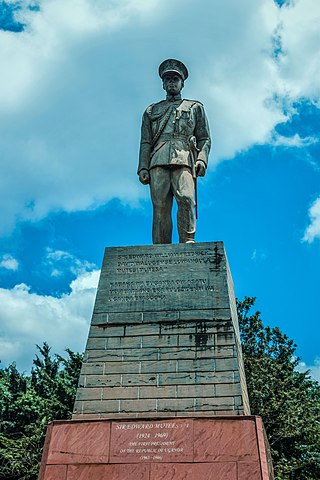Related Research Articles

Kampala is the capital and largest city of Uganda. The city proper has a population of 3,846,000 and is divided into the five political divisions of Kampala Central Division,Kawempe Division,Makindye Division,Nakawa Division,and Rubaga Division.

Buganda is a Bantu kingdom within Uganda. The kingdom of the Baganda people,Buganda is the largest of the traditional kingdoms in present-day East Africa,consisting of Buganda's Central Region,including the Ugandan capital Kampala. The 14 million Baganda make up the largest Ugandan region,representing approximately 16% of Uganda's population.

Sir Edward Frederick William David Walugembe Mutebi Luwangula Muteesa II was Kabaka of the Kingdom of Buganda in Uganda from 22 November 1939 until his death. He was the thirty-fifth Kabaka of Buganda and the first president of Uganda from 1962-1966 when he was overthrown by Milton Obote. The foreign press often referred to him as King Freddie,a name rarely used in Uganda. An ardent defender of Buganda's interests,especially its traditional autonomy,he often threatened to make the kingdom independent both before and after Uganda's independence to preserve it. These firm convictions also later led to conflicts with his erstwhile political ally Milton Obote,who would eventually overthrow him.

The Uganda People's Congress is a political party in Uganda.

The Democratic Party is a moderate conservative political party in Uganda led by Norbert Mao. The DP was led by Paul Ssemogerere for 25 years until his retirement in November 2005. John Ssebaana Kizito replaced Ssemogerere,and led the party until February 2010,when Norbert Mao was elected party president.

The Conservative Party (CP) is a centre-right political party in Uganda. It is led by Ken Lukyamuzi.

Kabaka Yekka,commonly abbreviated as KY,was a monarchist political movement and party in Uganda. Kabaka Yekka means 'king only' in the Ganda language,Kabaka being the title of the King in the kingdom of Buganda.
The Buganda Crisis,also called the 1966 Mengo Crisis,the Kabaka Crisis,or the 1966 Crisis,domestically,was a period of political turmoil that occurred in Buganda. It was driven by conflict between Prime Minister Milton Obote and the Kabaka of Buganda,Mutesa II,culminating in a military assault upon the latter's residence that drove him into exile.

The Chiefdom of Kooki,also known as the Kooki chiefdom,was a pre-colonial African kingdom located within present-day Rakai District of Uganda that existed from approximately 1740 until 1896. The kingdom ceased to exist as an independent state in 1896 when it merged into the British Protectorate of Buganda. Its royal line still continues to this day as a Chiefdom,and is currently led by The Kamuswaga Apollo Sansa Kabumbuli II a hereditary Saza Chief on behalf of the Kabaka of Buganda. In 27 July 2015,the Kooki Kingdom declared independence from Buganda but it wasn't recognized by Buganda or Uganda.

The history of Buganda is that of the Buganda kingdom of the Baganda people,the largest of the traditional kingdoms in present-day Uganda.
Mengo is a hill in Rubaga Division,Kampala,Uganda's capital and largest city. The name also applies to the neighborhood on that hill.
Namirembe is a hill in Kampala,Uganda's capital and largest city. It is also a common name given to girls in several Baganda clans. Namirembe comes from the Luganda word "mirembe" meaning peace. Namirembe loosely translates into Full of Peace. Legend has it that this hill was a gathering place for celebrating peace or war victories.

The Bulange (boo-lah-ngeh) is a building in Uganda. It houses the Lukiiko (Parliament) of the Kingdom of Buganda. The Kabaka of Buganda and the Katikkiro of Buganda also maintain offices in the building. The building serves as the administrative headquarters of the Buganda Kingdom.
Charles Peter Mayiga is a Ugandan lawyer,cultural leader and author. He is the current katikkiro of Buganda,a constitutional monarchy in present-day Uganda. He was appointed to that position by the reigning Kabaka of Buganda,His Majesty Muwenda Mutebi II of Buganda,in May 2013,replacing engineer John Baptist Walusimbi.
Jehoash Ssibakyalyawo Mayanja Nkangi or Joash Mayanja Nkangi was a Ugandan lawyer,civil servant and politician. At the time of his death,he was the immediate past chairman of the Uganda Land Commission. He previously served as a cabinet minister in several ministries in the Cabinet of Uganda.
Daudi Ochieng,sometimes styled Ocheng,was a Ugandan politician,who served as secretary general of the Kabaka Yekka (KY) party and Opposition Chief Whip. In 1965–6,his allegations –crystallised in a motion he put before Parliament on 4 February 1966 –that then-Prime Minister Milton Obote and deputy commander of the Ugandan army Idi Amin had been complicit in the looting and misappropriation of gold,ivory and cash by Congolese rebels precipitated the Gold Scandal.
Joyce Rovincer Mpanga was a Ugandan politician and member of the Lukiiko from 2009. Mpanga was the Minister of Women in Development from 1988 to 1989 and the Minister of State for Primary Education from 1989 to 1992. Outside of the cabinet of Uganda,Mpanga was a Member of Parliament from 1996 to 2001 for Mubende District.
Florence Alice Lubega was a Ugandan politician and the first female Ugandan to join Parliament in the independent Uganda in May 1962. She was one of the first female legislators of Uganda,being a member of the Legislative Council (LEGCO). She was also a member of the first Ugandan Parliament,and Deputy Minister for Community Development and Labour.
The Kabaka crisis was a political and constitutional crisis in the Uganda Protectorate between 1953 and 1955 wherein the Kabaka Mutesa II pressed for Bugandan secession from the Uganda Protectorate and was subsequently deposed and exiled by the British governor Andrew Cohen. Widespread discontent with this action forced the British government to backtrack,resulting in the restoration of Mutesa as specified in the Buganda Agreement of 1955,which ultimately shaped the nature of Ugandan independence.
Uganda National Congress (UNC) was the first political party in Uganda.
References
- ↑ "The National Honours and Awards (Award of National Honours) Notice, 2018" (PDF). gazettes.africa. 27 April 2018. Retrieved 19 October 2023.
- 1 2 "Sugra Visram, one of the first female MPs in Uganda is dead". Ismailimail. 2012-11-02. Retrieved 2022-03-26.
- 1 2 3 4 Wulira! (2017-10-17). "Episode notes: Sugra Visram and the start of family planning in Uganda". Medium. Retrieved 2022-03-26.
- 1 2 3 4 5 http://awaazmagazine.com/previous/index.php/component/k2/item/275-ugandas-reluctant-hero-sugra-visram [ permanent dead link ]
- 1 2 3 Tripp, Aili Mari (2000). Women & politics in Uganda. Madison. ISBN 978-0-299-16483-6. OCLC 841171389.
{{cite book}}: CS1 maint: location missing publisher (link) - ↑ "CMIS Repository | Parliament of Uganda".
- 1 2 3 "Sugra Visram, one of the first female MPs in Uganda is dead". Monitor. 2021-01-23. Retrieved 2022-03-26.
- ↑ Tamale, Sylvia (1999). When hens begin to crow : gender and parliamentary politics in Uganda. Boulder, Colo.: Westview Press. ISBN 0-8133-3462-4. OCLC 39307485.
- ↑ "When Hens Begin To Crow: Gender And Parliamentary Politics In Uganda". silo.pub. 2010-06-13. Retrieved 2022-03-26.
- ↑ "When Hens begin to Crow - Gender and Parliamentary Politics in Uganda (Fountain Publishers, 1999, 254 p.): 1 Introduction: Notes". www.nzdl.org. Retrieved 2022-03-26.